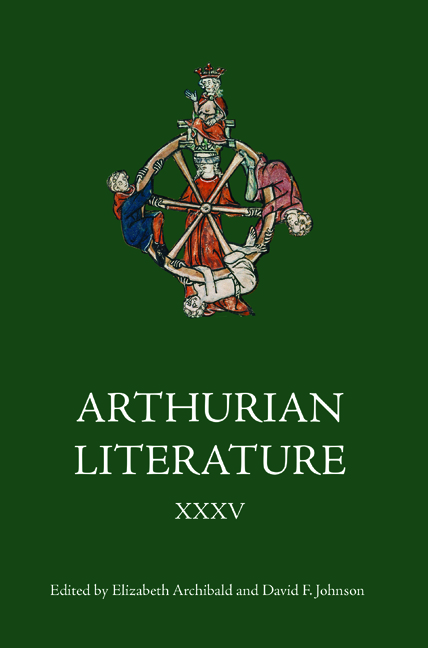Book contents
- Frontmatter
- Contents
- List of Illustrations
- General Editors’ Foreword
- List of Contributors
- I Arthurian Swords I: Gawain’s Sword and the Legend of Weland the Smith
- II Rex rebellis et vir pacificus: Civil War and Ecclesiastical Peacekeeping in the Vita Gildae of Caradog of Llancarfan
- III Once and Future History: Textual Borrowing in an Account of the First War of Scottish Independence
- IV ‘Me rewes sore’: Women’s Friendship, Affect and Loyalty in Ywain and Gawain
- V The Sacred and the Secular: Alchemical Transformation in The Turke and Sir Gawain
- VI ‘The native place of that great Arthur’: Foreignness and Nativity in Sixteenth-Century Defences of Arthur
- VII John Steinbeck’s ‘Wonder-Words’
- VIII The Once and Future King of Atlantis: The Arthurian Figure in Geoff Johns’s Aquaman: Death of a King
- IX Arthur and/or the Grail
- Miscellaneous Endmatter
IX - Arthur and/or the Grail
Published online by Cambridge University Press: 11 September 2020
- Frontmatter
- Contents
- List of Illustrations
- General Editors’ Foreword
- List of Contributors
- I Arthurian Swords I: Gawain’s Sword and the Legend of Weland the Smith
- II Rex rebellis et vir pacificus: Civil War and Ecclesiastical Peacekeeping in the Vita Gildae of Caradog of Llancarfan
- III Once and Future History: Textual Borrowing in an Account of the First War of Scottish Independence
- IV ‘Me rewes sore’: Women’s Friendship, Affect and Loyalty in Ywain and Gawain
- V The Sacred and the Secular: Alchemical Transformation in The Turke and Sir Gawain
- VI ‘The native place of that great Arthur’: Foreignness and Nativity in Sixteenth-Century Defences of Arthur
- VII John Steinbeck’s ‘Wonder-Words’
- VIII The Once and Future King of Atlantis: The Arthurian Figure in Geoff Johns’s Aquaman: Death of a King
- IX Arthur and/or the Grail
- Miscellaneous Endmatter
Summary
In John Boorman's 1981 film Excalibur, we find a lethargic, ill and passive King Arthur in a land that is waste and sterile. There appears to be no remedy for either the court or the land until Arthur has an inspired idea: the Grail quest. He says that they must seek what was lost; they must seek the Grail. We are not told how Arthur knows about the Grail's power, and even more remarkably, we are not told why, since he does know, from whatever source, that the Grail is their salvation, he did not announce the quest earlier. Puzzling as those questions are, the more significant fact for our present purposes is that it is the King himself who orders the quest, and he and his land will be the beneficiary of its healing power. He thus takes here the double role of King and Fisher King, the latter being traditionally an entirely different figure: the maimed king who can be healed only by another character's success in the Grail quest.
The importance of this doubling is that Boorman (and a number of authors writing before and since the making of his film) either thought or would have us think that, because Arthur is the greatest of kings and the Grail the holiest of objects, it is natural that Arthur would commission his knights to find this sacred relic. Indeed, it may well be another film that has confirmed Arthur's supposed sponsorship of the Grail quest. Anyone familiar with Monty Python and the Holy Grail – and who is not? – will recall that God appears from the clouds, excoriates Arthur for ‘groveling’ and informs him that his mission is to find the Grail. Arthur then recruits knights to assist in his holy quest, and some of them accept the charge (though the French confuse matters by insisting that they already have a grail).
It was in fact a Frenchman who started the tantalizing story of the Holy Grail.
- Type
- Chapter
- Information
- Arthurian Literature XXXV , pp. 200 - 213Publisher: Boydell & BrewerPrint publication year: 2019

